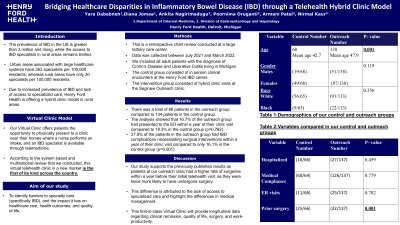Back


Poster Session B - Monday Morning
Category: IBD
B0399 - Bridging Healthcare Disparities in Inflammatory Bowel Disease (IBD) Through a Telehealth Hybrid Clinic Model
Monday, October 24, 2022
10:00 AM – 12:00 PM ET
Location: Crown Ballroom

Has Audio

Yara Dababneh, MD
Henry Ford Hospital
Detroit, MI
Presenting Author(s)
Yara Dababneh, MD1, Diana Jomaa, MD2, Ankita Nagirimadugu, MD1, Poornima Oruganti, MD1, Armani Patel, MD1, Nirmal Kaur, MD1
1Henry Ford Hospital, Detroit, MI; 2Henry Ford Health, Detroit, MI
Introduction: Due to increased prevalence of IBD and lack of access to specialized care, Henry Ford Health is offering a hybrid clinic model in rural areas, that offers patients the opportunity to physically present to a clinic near their homes where a nurse performs an intake, and an IBD specialist is available through telemedicine. This study was designed to identify barriers to IBD care, and the impact it has on healthcare cost and quality of life.
Methods: This is a retrospective chart review conducted at a large tertiary care center. Data were collected between July 2021 and March 2022. We included all adult patients with the diagnosis of Crohn’s Disease and Ulcerative Colitis living in Michigan. The control group consisted of in person clinical encounters at the Henry Ford IBD center in Novi, Michigan. The intervention group consisted of hybrid clinic visits at the Saginaw Outreach clinic. We gathered data on IBD flares, hospitalization, medication compliance, need for surgery within the past year, and emergency department (ED) visits at both sites.
Results: There was a total of 68 patients in the outreach group compared to 134 patients in the control group. The analysis showed that 16.7% of the outreach group had presented to the ED within a year of their clinic visit compared to 18.3% in the control group (p=0.782). While 24.2% of the outreach group were hospitalized compared to 19.7% in the control group (p= 0.459). Finally, 37.9% of the patients in the outreach group had IBD complications necessitating surgical interventions within a year of their clinic visit compared to only 16.1% in the control group (p=0.001).
Discussion: Providing cost-effective care that is available for patients with IBD was the main driving factor of our hybrid telehealth model. According to the system based and multinational review that we conducted this hybrid telehealth clinic is the first of its kind across the country. Financial challenges are a more prevalent barrier in accessing office-based care in rural areas. Our study supports the previously published results as patients at our outreach clinic had a higher rate of surgeries within a year before their initial telehealth visit, as they were twice more likely to have undergone surgery within the past year. This is attributed to the lower socioeconomic status and lack of access to specialized care. In conclusion, this is a longitudinal study to assess if the telemedicine clinic can aid patients in attaining clinical remission and improving quality of life.
Disclosures:
Yara Dababneh, MD1, Diana Jomaa, MD2, Ankita Nagirimadugu, MD1, Poornima Oruganti, MD1, Armani Patel, MD1, Nirmal Kaur, MD1. B0399 - Bridging Healthcare Disparities in Inflammatory Bowel Disease (IBD) Through a Telehealth Hybrid Clinic Model, ACG 2022 Annual Scientific Meeting Abstracts. Charlotte, NC: American College of Gastroenterology.
1Henry Ford Hospital, Detroit, MI; 2Henry Ford Health, Detroit, MI
Introduction: Due to increased prevalence of IBD and lack of access to specialized care, Henry Ford Health is offering a hybrid clinic model in rural areas, that offers patients the opportunity to physically present to a clinic near their homes where a nurse performs an intake, and an IBD specialist is available through telemedicine. This study was designed to identify barriers to IBD care, and the impact it has on healthcare cost and quality of life.
Methods: This is a retrospective chart review conducted at a large tertiary care center. Data were collected between July 2021 and March 2022. We included all adult patients with the diagnosis of Crohn’s Disease and Ulcerative Colitis living in Michigan. The control group consisted of in person clinical encounters at the Henry Ford IBD center in Novi, Michigan. The intervention group consisted of hybrid clinic visits at the Saginaw Outreach clinic. We gathered data on IBD flares, hospitalization, medication compliance, need for surgery within the past year, and emergency department (ED) visits at both sites.
Results: There was a total of 68 patients in the outreach group compared to 134 patients in the control group. The analysis showed that 16.7% of the outreach group had presented to the ED within a year of their clinic visit compared to 18.3% in the control group (p=0.782). While 24.2% of the outreach group were hospitalized compared to 19.7% in the control group (p= 0.459). Finally, 37.9% of the patients in the outreach group had IBD complications necessitating surgical interventions within a year of their clinic visit compared to only 16.1% in the control group (p=0.001).
Discussion: Providing cost-effective care that is available for patients with IBD was the main driving factor of our hybrid telehealth model. According to the system based and multinational review that we conducted this hybrid telehealth clinic is the first of its kind across the country. Financial challenges are a more prevalent barrier in accessing office-based care in rural areas. Our study supports the previously published results as patients at our outreach clinic had a higher rate of surgeries within a year before their initial telehealth visit, as they were twice more likely to have undergone surgery within the past year. This is attributed to the lower socioeconomic status and lack of access to specialized care. In conclusion, this is a longitudinal study to assess if the telemedicine clinic can aid patients in attaining clinical remission and improving quality of life.
Disclosures:
Yara Dababneh indicated no relevant financial relationships.
Diana Jomaa indicated no relevant financial relationships.
Ankita Nagirimadugu indicated no relevant financial relationships.
Poornima Oruganti indicated no relevant financial relationships.
Armani Patel indicated no relevant financial relationships.
Nirmal Kaur: abbvie – Speakers Bureau.
Yara Dababneh, MD1, Diana Jomaa, MD2, Ankita Nagirimadugu, MD1, Poornima Oruganti, MD1, Armani Patel, MD1, Nirmal Kaur, MD1. B0399 - Bridging Healthcare Disparities in Inflammatory Bowel Disease (IBD) Through a Telehealth Hybrid Clinic Model, ACG 2022 Annual Scientific Meeting Abstracts. Charlotte, NC: American College of Gastroenterology.
